

Formative assessment - Google Slides. Reduce-workload. Authentic Tasks. Authentic Tasks Characteristics of Authentic Tasks Types of Authentic Tasks Authentic Task: An assignment given to students designed to assess their ability to apply standard-driven knowledge and skills to real-world challenges In other words, a task we ask students to perform is considered authentic when 1) students are asked to construct their own responses rather than select from ones presented and 2) the task replicates challenges faced in the real world.
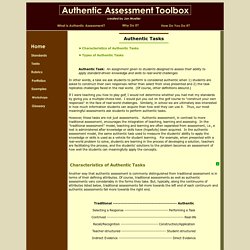
(Of course, other definitions abound.) If I were teaching you how to play golf, I would not determine whether you had met my standards by giving you a multiple-choice test. I would put you out on the golf course to "construct your own responses" in the face of real-world challenges. However, these tasks are not just assessments. Another way that authentic assessment is commonly distinguished from traditional assessment is in terms of their defining attributes. Traditional ------------------------------------------- Authentic Also, see. How_assessment_literacy_can_improve_instruction.pdf. Spotlight-Classroom-Assessment.pdf. Science Assessment ~ Topics ~ Control of Variables. Below is a list of key ideas related to Control of Variables.
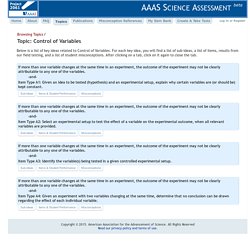
For each key idea, you will find a list of sub-ideas, a list of items, results from our field testing, and a list of student misconceptions. After clicking on a tab, click on it again to close the tab. If more than one variable changes at the same time in an experiment, the outcome of the experiment may not be clearly attributable to any one of the variables. -and-Item Type A1: Given an idea to be tested (hypothesis) and an experimental setup, explain why certain variables are (or should be) kept constant. These items have been aligned to more than one key idea. If more than one variable changes at the same time in an experiment, the outcome of the experiment may not be clearly attributable to any one of the variables. If more than one variable changes at the same time in an experiment, the outcome of the experiment may not be clearly attributable to any one of the variables.
Galpern.pdf. Designing Professional Development for Assessment. Abstract Teachers rarely have opportunities to engage in assessment design even though classroom assessment is fundamental to effective teaching.
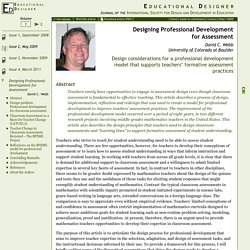
This article describes a process of design, implementation, reflection and redesign that was used to create a model for professional development to improve teachers’ assessment practices. The improvement of the professional development model occurred over a period of eight years, in two different research projects involving middle grades mathematics teachers in the United States. Improving_Teachers_Assessment.pdf.
ScienceLynx - SEAR science resource. The Science Education Assessment Resources (SEAR) provide a wide range of assessment resources (or 'tasks') suitable for use across the compulsory years of schooling.
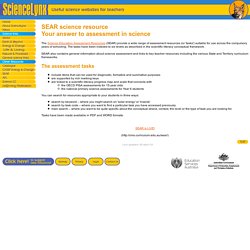
The tasks have been indexed to six levels as described in the scientific literacy conceptual framework. SEAR also contains general information about science assessment and links to key teacher resources including the various State and Territory curriculum frameworks. include items that can be used for diagnostic, formative and summative purposes are supported by rich marking keys are linked to a scientific literacy progress map and scale that connects with the OECD PISA assessments for 15-year olds the national primary science assessments for Year 6 students You can search for resources appropriate to your students in three ways: Tasks have been made available in PDF and WORD formats.
SEAR is LIVE! CMS - default title. AssessmentforLearning.pdf. EJ1022890.pdf. d2.1. Assessing_21st_century_skills_ncme.pdf. Stateimp_assessment. File.aspx. Just Science Now. What is Assessment?
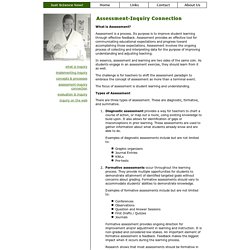
Assessment is a process. Its purpose is to improve student learning through effective feedback. Assessment provides an effective tool for communicating educational expectations and progress toward accomplishing those expectations. Assessment involves the ongoing process of collecting and interpreting data for the purpose of improving understanding and adjusting teaching. In essence, assessment and learning are two sides of the same coin. Assessment_Strategies.pdf. 6886_lantz_ch_1.pdf. Science education and test‐based accountability: Reviewing their relationship and exploring implications for future policy - Anderson - 2011 - Science Education.
Abstract Assuming that quality science education plays a role in economic growth within a country, it becomes important to understand how education policy might influence science education teaching and learning.
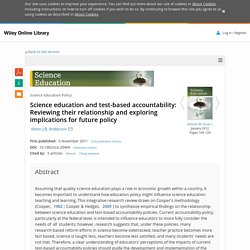
This integrative research review draws on Cooper's methodology (Cooper, 1982; Cooper & Hedges, 2009) to synthesize empirical findings on the relationship between science education and test-based accountability policies. Current accountability policy, particularly at the federal level, is intended to influence educators to more fully consider the needs of all students; however, research suggests that, under these policies, many research-based reform efforts in science become sidetracked, teacher practice becomes more fact based, science is taught less, teachers become less satisfied, and many students' needs are not met. Select a PDF to begin download Download PDF158.8 kB. Reworking practice through an AfL project: an analysis of teachers’ collaborative engagement with new assessment guidelines - Hermansen - 2013 - British Educational Research Journal.
Abstract In recent years, the concept of Assessment for Learning (AfL) has travelled across countries, giving rise to a range of educational policy initiatives and school development projects.
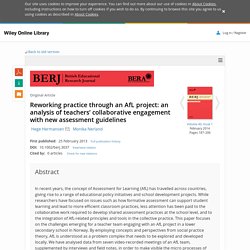
While researchers have focused on issues such as how formative assessment can support student learning and lead to more efficient classroom practices, less attention has been paid to the collaborative work required to develop shared assessment practices at the school level, and to the integration of AfL-related principles and tools in the collective practice. This paper focuses on the challenges emerging for a teacher team engaging with an AfL project in a lower secondary school in Norway.
By employing concepts and perspectives from social practice theory, AfL is understood as a problem complex that needs to be explored and developed locally. Developing a Measure of Scientific Literacy for Middle School Students - FIVES - 2014 - Science Education. Scientific literacy reflects “a broad and functional understanding of science for general education purposes” (DeBoer, 2000, p. 594).
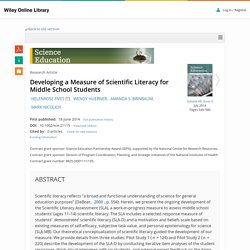
Herein, we present the ongoing development of the Scientific Literacy Assessment (SLA), a work-in-progress measure to assess middle school students’ (ages 11–14) scientific literacy. The SLA includes a selected response measure of students’ demonstrated scientific literacy (SLA-D) and a motivation and beliefs scale based on existing measures of self-efficacy, subjective task value, and personal epistemology for science (SLA-MB).
Our theoretical conceptualization of scientific literacy guided the development of our measure. We provide details from three studies: Pilot Study 1 (n = 124) and Pilot Study 2 (n = 220) describe the development of the SLA-D by conducting iterative item analyses of the student responses, think-aloud interviews with six students, and external expert feedback on the items in the SLA-D.
Assessment of Performance Unit Science Reports for Teachers. File-147. File-147. File. Pdst. Collaborative assessment. Bennett_preparing_future_what_educational_assessment_must_do. Gordon Commission: Home. Education Week. Links to blogs on marking. About six weeks ago I started work on a blog for the October Blogsync “Marking with Impact”, I thought it would be a quick piece, maybe a few hours work.
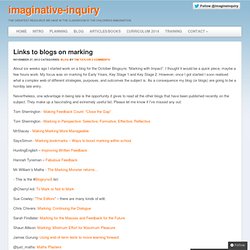
My focus was on marking for Early Years, Key Stage 1 and Key Stage 2. However, once I got started I soon realised what a complex web of different strategies, purposes, and outcomes the subject is. As a consequence my blog (or blogs) are going to be a horribly late entry. Nevertheless, one advantage in being late is the opportunity it gives to read all the other blogs that have been published recently on the subject. They make up a fascinating and extremely useful list. Tom Sherrington - Making Feedback Count: “Close the Gap” Tom Sherrington - Marking in Perspective: Selective, Formative, Effective, Reflective. Marking is an act of love. Have you ever flicked back through an exercise book and seen the same repeated comments followed with soul numbing certainty by the same repeated mistakes?
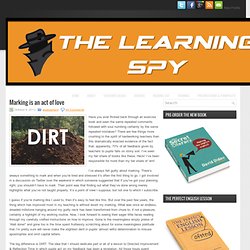
There are few things more crushing to the spirit of hardworking teachers than this dramatically enacted evidence of the fact that, apparently, 70% of all feedback given by teachers to pupils falls on stony soil. I’ve seen my fair share of books like these. Heck! I’ve been responsible for more than my fair share of ‘em! I’ve always felt guilty about marking. Education Week. Formative Assessment. Life after levels: who’ll create a mastery assessment system. Whosever redesigns their curriculum and assessment for life after levels will reap the benefits A great many schools I know are now considering the question of what to do about assessment.
‘Is there an alternative to national levels?’ They are asking. After all, assessment drives the curriculum: the curriculum cannot be considered without considering how it is being assessed. Here is the argument that I am building up on this blog: Our curriculum and assessment aren’t designed with memory in mind. National levels are imprecise, ill-sequenced and confusing. So we must redesign our curricula and assessment for memory with precision, sequencing and visibility in mind. “There is plenty of mileage in Joe Kirby’s mastery model, but it needs flesh on the bones to become a viable proposition,” said Chris Hildrew in a recent blog. Improving Written Feedback. This week I gave a seminar at TeachMeet Clevedon. I am going to post more fully on my topic of teachers getting better by undertaking ‘deliberate practice‘ sometime soon. One smaller aspect of my presentation was how teachers can improve written feedback, both to improve learning and to marginally reduce the time taken to give written feedback.
With the gift of more time we can free ourselves to pursue becoming a better teacher more deliberately: with reflection, planning and deliberate practice. Of course, written feedback is so crucial that it can improve teaching and learning significantly, therefore it deserves our attention in its own right. What Teachers Really Need to Know About Formative Assessment. Reduce-workload.jpg (JPEG Image, 1611 × 2320 pixels) - Scaled (28%)